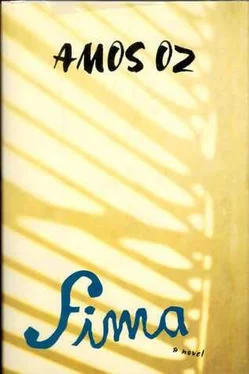Closing the fridge, Fima decided to go out for breakfast this morning, to Mrs. Scheinbaum's little café across the road, partly because he did not want to spoil the impeccable tidiness of his newly cleaned kitchen, partly because the bread was stale and the margarine reminded him of the horrible jellylike taps in his dream, and above all because the electric kettle had burned itself out the previous day, and without a kettle there would be no coffee.
At a quarter past eight he left the flat without noticing the bloodstained wad of cotton wool clinging to the cut on his cheek. But he did remember to take the trash down, and he also remembered to slip the envelope containing the article he had written in the night into his pocket, and he did not even forget the mailbox key. At the shopping center three blocks away he bought fresh bread, cheese, tomatoes, jam, eggs, some yogurt, coffee, three light bulbs, to have a reserve, and also a new electric kettle. He instantly regretted not having checked to see if it was made in Germany: he did his best to avoid buying German products. To his relief he discovered that it came from South Korea. Unpacking the shopping, he changed his mind and decided to skip the café and have his breakfast at home after all. Although, on second thought, South Korea was also a notoriously repressive country, famous for smashing the skulls of demonstrating students. While he waited for the water to boil, he reconstructed the Korean War, the era of Truman, MacArthur, and McCarthy, and ended with the destruction of Hiroshima and Nagasaki. The next nuclear holocaust won't start with the superpowers, it'll start with us here, he thought. With our regional conflict. The Syrians will invade the Golan Heights with a thousand tanks, we'll bomb Damascus, they'll fire a salvo of missiles at the coastal towns, and then we'll set off the doomsday mushroom. In a hundred years there won't be a living soul here. No Yoezer, no lizard, no cockroach.
But Fima rejected the word "holocaust" because it could also be associated with natural disasters such as floods, epidemics, and earthquakes. What the Nazis did, by contrast, was an organized, premeditated crime that ought to be called by its proper name: murder. And nuclear war will also be a criminal act. Neither "holocaust" nor "doomsday." Fima also ruled out the word "conflict," which might describe the business of Annette and her husband, or Tsvi Kropotkin and his teaching assistant, but not the bloody war between us and the Arabs. In fact, even the sad case of Annette and Yen could hardly be categorized with such a sterile term as "conflict." As for the expression "bloody war," it was a tired cliché. Even "tired cliché" was a tired cliché. You've worked yourself into a corner, pal.
Suddenly he felt disgusted with his linguistic niceties. Gulping down thick slices of bread and jam, sipping his second coffee, he said to himself: When the whole planet has been destroyed by atom bombs or hydrogen bombs, what difference will it make whether we describe it as a conflict, holocaust, doomsday, or a bloody war? And who will be left to decide which is the most appropriate description? So Baruch was right when he used the expressions "a handful of dust," "a putrid drop," "a fleeting shadow." And the Likud member of parliament was right to recommend playing for time. Even the orgiastic radio announcer was right when she said that there were lessons to be drawn.
But what lessons? What precious light, for heaven's sake?
The snows of yesteryear. The bones of yesteryear.
I'd hang the pair of them.
Look what they've done to you, stupid.
Your problem, pal.
So surely that is the root of all evil, Fima suddenly shouted, alone in his kitchen, as though he had received a dazzling revelation, as though a simple solution to the problem of jet propulsion on land had flashed into his head. That is the original sin. The Other Side is the source of all our misfortunes. Because there is no such thing as your problem, my problem, her problem, his problem, their problem. It's all our problem. There, the Korean kettle's boiling again, and if you don't switch it off, it'll go exactly the way of its predecessor. Who asked for coffee anyway? I've had two cups already. Instead of drinking coffee you'd better go back to the shopping center, because although you remembered to put a stamp on the envelope with the article in it and to put it in your pocket, you forgot to take it out of your pocket and mail it when you bought the kettle. What's going to become of you, mister? When arc you going to be a mensch?
14. DISCOVERING THE IDENTITY OF A FAMOUS FINNISH GENERAL
ONE FRIDAY EVENING THE MUSE DESCENDED ON FIMA, AND HE entertained the company with the story of how he was called up for reserve duty during the Six Days' War and dumped on a barren hilltop just outside Arnona with a painter and a couple of university professors. They were given a pair of binoculars and a field telephone and told not to fall asleep. On the next hill some Jordanian soldiers were setting up mortars and a machine gun; they were going about it calmly, like boy scouts at a camp. When they had finished all their preparations, they Jay down and started firing at Fima and his pals. "Can you guess," Fima asked, "what my first thought was? No, it wasn't to run away. It wasn't to fire back, either. No. It was simply to phone the police and complain that there were some madmen shooting at us. Even though they could see perfectly well that there were people here on this hill. What did they take me for, a friend or acquaintance? Had I seduced their wives? What did they know about me anyway? I had to get the police to come right away and take care of them. That was how I felt."
There was a news item in Ha'arets that seemed to hint at a slight softening in the government's position. A kind of sign of readiness to rethink at least one element in the official line. Fima saw in this a confirmation of his theory about tiny movements. He therefore convened the Revolutionary Council for a short morning meeting in Tsvika's seminar room at the Mount Scopus campus. He announced that he had changed his mind and decided to put off flying to Tunis. This time the peace process must begin not with an operatic overture, in the style of Begin and Sadat, but with an exchange of small gestures that might gradually break down the barriers of hatred and anger. Or set in motion the first stirrings of an emotional détente. Joycean ripples rather than Shakespearean breakers. Tropisms rather than cataclysms. The proposal on the agenda is the following. The PLO agrees to assist in the rescue of the remaining Jews of Ethiopia. Or Yemen. We send a letter of thanks to their Tunis headquarters, thus opening up a chink in the deadlock. Tsvi is wrong to hope for U.S. pressure. And Uri Gefen is definitely wrong in maintaining that the situation has to get much worse before there can be any change for the better. Both attitudes express the tacit inclination of the doveish left to wait resignedly for a change in reality instead of getting up and doing something. Even if it is something limited.
He suddenly felt a longing for Uri's presence: his broad shoulders, his jokes, his deep warm laughter, his youth leader's manner, his peas-antlike habit of hugging your shoulders, punching you in the stomach, and saying, for instance, Come here, you Salman Rushdie; where have you been hiding yourself? And after a furtive sniff and an ostentatious wrinkling of the nose, When did you last change your shirt? For Ben Gurion's funeral? And then again: All right, get on with it, if there's no alternative: give us your lecture on Christian ascetic seas. But first help yourself to a slice of this smoked ham. Or have you turned Muslim on us?
The longing for Uri's warm voice and body brought with it a desire to rest his own pale fingers on his friend's huge freckled hand, gnarled like a stoneworker's, and to generate flashing sparks of wit that would cause the discussion to take amazing turns at every point. Like three weeks ago, at the Kropotkins', when Shula was voicing her fear of Islamic fundamentalism, and Fima interrupted her and dazzled everyone by arguing that our feud with the Arabs is merely a hundred-year-old episode, a mere dispute over land, whereas the real danger always was and still is the bottomless chasm between the Jews and the Cross. Despite his longing, Fima hoped that Uri was still in Rome. He dialed Nina's office, and hung on patiently until the secretary passed him Nina's tobacco-charred voice saying, Yes, Fima, but make it short; I'm in a meeting. He tried to tempt her into going out with him that evening, to see the late showing of the film with Jean Gabin at the Orion. I made a real ass of myself two nights ago, he said, but tonight I'll be on my best behavior. You'll sec. Promise.
Читать дальше












